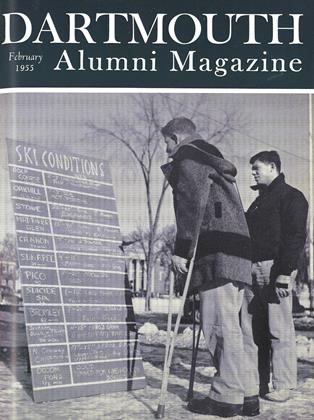IN the weeks since the Dartmouth Athletic Council announced that the contracts of the football coaching staff would not be renewed for the coming year a certain few sections of the press have indulged in a lambasting of the College. They have charged or implied unfair treatment of "Tuss" McLaughry and his assist- ants, a radical change in the College's athletic and admissions policies, and the adoption by Dartmouth of a win-or-else attitude. Naturally enough, this sort of press treatment has upset some _ alumni who have read those columns.
That Dartmouth might be in for such a public relations beating was foreseen by the Athletic Council when it took a firm decision not to make any public statement about the details of its December 5 action. It is to the credit of the Athletic Council, we believe, that this course of action was adopted simply because it was considered to best serve the personal interests of the coaches. Thus left to their own guesswork, some sports columnists wrote in a vein of personal or institutional abuse that reflected, as might be expected, the strong feelings of those loyal to Coach McLaughry. In a rather perverse way, this was part of the tribute to Coach McLaughry by the press, which over the years has had opportunity - as have many others in and out of Hanover - to become acquainted with his fine personal qualities and his contributions to the game of football.
The Athletic Council still considers it sound policy not to engage in public discussion of the details of its decision to make a fresh football start at Dartmouth, and the ALUMNI MAGAZINE is not going to flout that considered judgment, which it respects, by indulging in speculation of its own. We believe we are on solid ground, however, in saying that the basic reasons for a change in Dartmouth's football directorate were discussed with Coach McLaughry over the past three years and the completion of his five-year contract was accepted by the DCAC as an appropriate point at which to carry through a contemplated change, believed to be in the best interests of Dartmouth football. Among the more fanciful claims by the sports columnists are those that the DCAC action was taken suddenly as a result of alumni pressure and as a result of the poor 1954 season.
It only remains to be stated, we believe, that Dartmouth's general athletic policy is unchanged, that its adherence to the spirit and the letter of the Ivy League agreement is as wholehearted as ever, and that if the alleged reversal of admissions and financial aid policy were actually taking place, there would be enough internal fireworks to be visible for miles around Hanover.
 View Full Issue
View Full Issue
More From This Issue
-
 Feature
FeaturePublic Interest an The Technological Revolution
February 1955 By LLOYD V. BERKNER -
 Feature
FeatureMan's Aggressive Nature
February 1955 By GEORGE E. GARDNER '25 -
 Class Notes
Class Notes1918
February 1955 By ERNEST H. EARLEY, W. CURTIS GLOVER, RICHARD P. WHITE -
 Class Notes
Class Notes1923
February 1955 By CHESLEY T. BIXBY, CHARLES H. JONES JR., TRUMAN T. METZEL -
 Class Notes
Class Notes1926
February 1955 By HERBERT H. HARWOOD, H. DONALD NORSTRAND, RICHARD M. NICHOLS -
 Article
ArticleThe Underĝraduate Chair
February 1955 By G. H. CASSELS-SMITH '55
Article
-
 Article
ArticleALUMNI FUND REPORT
February 1917 -
 Article
ArticleFootball Ticket Survey
APRIL 1932 -
 Article
ArticleHeads Planning Board
October 1934 -
 Article
ArticleREPORT OF THE ALUMNI FUND COMMITTEE
AUGUST 1930 By F. H. LEGGETT '98 -
 Article
ArticleThe College
March 1976 By Red Smith -
 Article
ArticleWE CAN'T BELIEVE IT
April 1934 By S. H. Silverman '34

